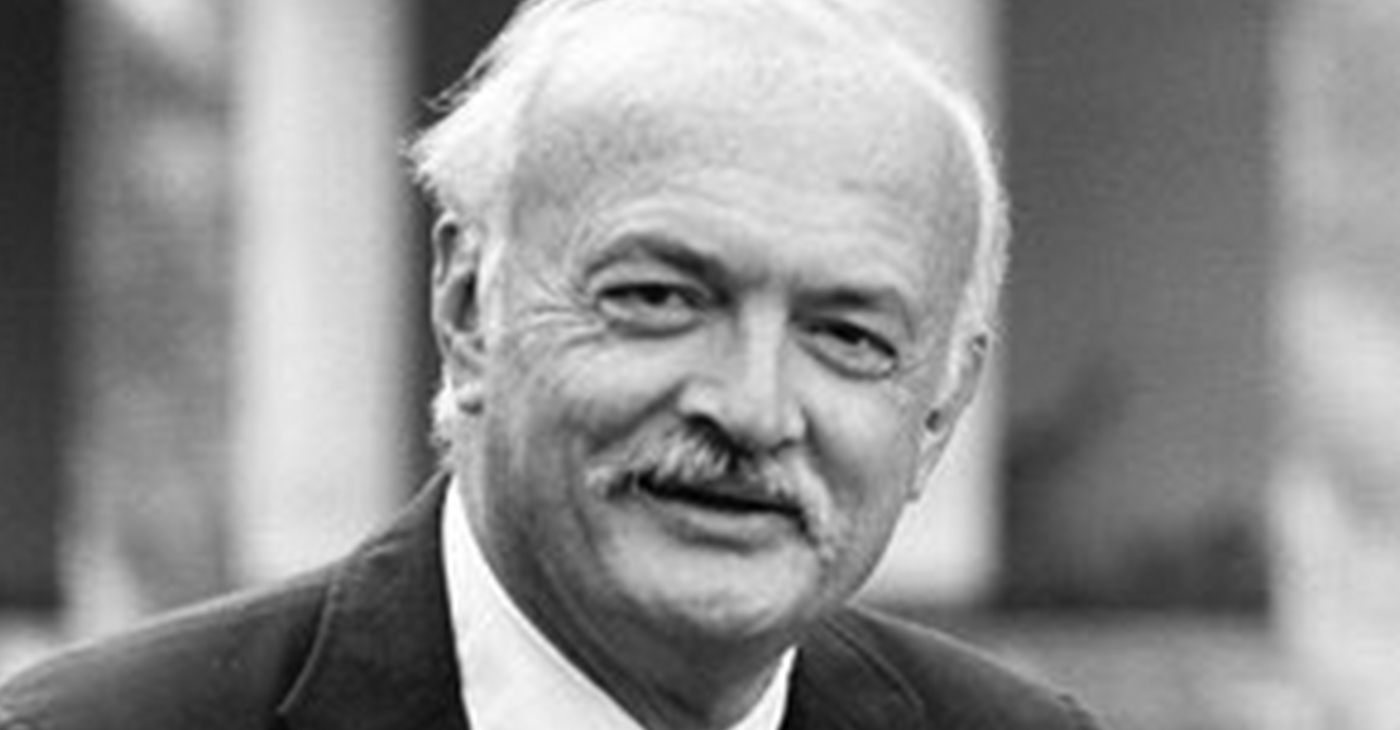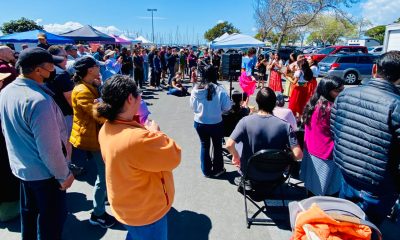Activism
IN MEMORIAM: Robert Farris Thompson, Renowned Professor of African American Studies
Prolific Professor Robert Farris Thompson truly embodied the term ‘Maestro de Maestros.’ He was an absolute giant in the field of Afro-Atlantic history and art, respected by his peers for his groundbreaking work and multiple major articles and publications, particularly the seminal “Flash of the Spirit” (1984) and “Faces of the Gods” (1993).

TRIBUTE
By John Santos
We’ve lost a Rosetta Stone.
Prolific Professor Robert Farris Thompson passed in his sleep Monday morning due to complications from Alzheimer’s disease and having been weakened by a bout with COVID-19 at the beginning of the year. He would’ve completed his 89th year on December 30.
Born on Dec. 30, 1932, Thompson was a White Texan who spectacularly disproved the fallacy of White supremacy through his pioneering and tireless elevation and clarification of African art, philosophy and culture. He removed the blinders and changed the way that generations of international students see African art.
A U.S. Army veteran, he went to Yale on a football scholarship and earned a B.A. in 1955. He joined the faculty in 1964 and earned his Ph.D. in 1965. He remained on the faculty until 2015.
‘Master T,’ as his students and friends often referred to him, was the Col. John Trumbull professor of the History of Art and professor of African American Studies at Yale University.
Thompson was also an Honorary Doctor of Humane Letters from the Maryland Institute College of Art.
He curated game-changing national exhibitions such as “African Art in Motion,” “The Four Moments of the Sun: Kongo Art in Two Worlds,” and “Faces of the Gods: Art and Altars of Africa and the African Americas.” The latter had a run at U.C. Berkeley in 1995 when local practitioners of African spirituality and musicians — including myself – demonstrated the powerful knowledge of tradition.
Thompson truly embodied the term ‘Maestro de Maestros.’ He was an absolute giant in the field of Afro-Atlantic history and art, respected by his peers for his groundbreaking work and multiple major articles and publications, particularly the seminal “Flash of the Spirit” (1984) and “Faces of the Gods” (1993). If he did not coin, he certainly standardized the term ‘Black Atlantic.’ He was a brilliant presenter, writer and teacher. But unlike many if not most academicians, he was also loved, revered and respected by the musicians, artists and communities about whom he wrote.
Initiated in Africa to Erinle, the deity of deep, still water, Thompson was hip, quirky and totally immersed in African and African-based music, dance, language, art and history. His lifetime of research, immersion and visionary work formed a bridge between Black America and her African roots.
Countless trips to Africa, the Southern U.S., the Caribbean and Central and South America informed his passionate work. He wrote about sculpture, painting, architecture, dance, music, language, poetry, food, the trans-Atlantic slave trade, African history, stolen antiquities, African spirituality, African retention, Brazil, Haiti, Cuba, Black Argentina, New York, México, mambo, tango, jazz, spirit possession and so much more. He recorded African drumming. He befriended giants of African diaspora music such as Julito Collazo, Babatunde Olatunji and Mongo Santamaría.
I first saw his writing around 1970 on the back of the classic red vinyl 1961 Mongo Santamaria LP, Arriba! La Pachanga (Fantasy 3324). They are inarguably among the deepest liner notes ever written.
He told me that he used our 1984 recording, Bárbara Milagrosa, by the Orquesta Batachanga, to demonstrate danzón-mambo to his students. I nearly burst into tears when he invited me and Omar Sosa to address and perform for his students at Yale, his alma mater, where he was a rock star. It was an unforgettable occasion for me.
He wrote wonderful liner notes on our 2002 Grammy-nominated production SF Bay, by the Machete Ensemble. He went out of his way to support and encourage countless students and followers like me. I was highly honored to count him as a friend as well as mentor.
He will be missed.
John Santos is a seven-time Grammy-nominated percussionist and former director of Orquesta Batachanga and Machete Ensemble and current director of the John Santos Sextet.
Activism
Oakland Post: Week of April 24 – 30, 2024
The printed Weekly Edition of the Oakland Post: Week of April 24 – 30, 2024

To enlarge your view of this issue, use the slider, magnifying glass icon or full page icon in the lower right corner of the browser window. ![]()
Activism
Oakland Post: Week of April 17 – 23, 2024
The printed Weekly Edition of the Oakland Post: Week of April 17 – 23, 2024

To enlarge your view of this issue, use the slider, magnifying glass icon or full page icon in the lower right corner of the browser window. ![]()
Activism
Oakland Schools Honor Fred Korematsu Day of Civil Liberties
Every Jan. 30, OUSD commemorates the legacy of Fred Korematsu, an Oakland native, a Castlemont High School graduate, and a national symbol of resistance, resilience, and justice. His defiant stand against racial injustice and his unwavering commitment to civil rights continue to inspire the local community and the nation. Tuesday was “Fred Korematsu Day of Civil Liberties and the Constitution” in the state of California and a growing number of states across the country.

By Post Staff
Every Jan. 30, OUSD commemorates the legacy of Fred Korematsu, an Oakland native, a Castlemont High School graduate, and a national symbol of resistance, resilience, and justice.
His defiant stand against racial injustice and his unwavering commitment to civil rights continue to inspire the local community and the nation. Tuesday was “Fred Korematsu Day of Civil Liberties and the Constitution” in the state of California and a growing number of states across the country.
One OUSD school is named in his honor: Fred T. Korematsu Discovery Academy (KDA) elementary in East Oakland.
Several years ago, founding KDA Principal Charles Wilson, in a video interview with anti-hate organization “Not In Our Town,” said, “We chose the name Fred Korematsu because we really felt like the attributes that he showed in his work are things that the children need to learn … that common people can stand up and make differences in a large number of people’s lives.”
Fred Korematsu was born in Oakland on Jan. 30, 1919. His parents ran a floral nursery business, and his upbringing in Oakland shaped his worldview. His belief in the importance of standing up for your rights and the rights of others, regardless of race or background, was the foundation for his activism against racial prejudice and for the rights of Japanese Americans during World War II.
At the start of the war, Korematsu was turned away from enlisting in the National Guard and the Coast Guard because of his race. He trained as a welder, working at the docks in Oakland, but was fired after the bombing of Pearl Harbor in 1941. Fear and prejudice led to federal Executive Order 9066, which forced more than 120,000 Japanese Americans out of their homes and neighborhoods and into remote internment camps.
The 23-year-old Korematsu resisted the order. He underwent cosmetic surgery and assumed a false identity, choosing freedom over unjust imprisonment. His later arrest and conviction sparked a legal battle that would challenge the foundation of civil liberties in America.
Korematsu’s fight culminated in the Supreme Court’s initial ruling against him in 1944. He spent years in a Utah internment camp with his family, followed by time living in Salt Lake City where he was dogged by racism.
In 1976, President Gerald Ford overturned Executive Order 9066. Seven years later, the 9th Circuit Court of Appeals in San Francisco vacated Korematsu’s conviction. He said in court, “I would like to see the government admit that they were wrong and do something about it so this will never happen again to any American citizen of any race, creed, or color.”
Korematsu’s dedication and determination established him as a national icon of civil rights and social justice. He advocated for justice with Rosa Parks. In 1998, President Bill Clinton gave him the Presidential Medal of Freedom saying, “In the long history of our country’s constant search for justice, some names of ordinary citizens stand for millions of souls … To that distinguished list, today we add the name of Fred Korematsu.”
After Sept. 11, 2001, Korematsu spoke out against hatred and discrimination, saying what happened to Japanese Americans should not happen to people of Middle Eastern descent.
Korematsu’s roots in Oakland and his education in OUSD are a source of great pride for the city, according to the school district. His most famous quote, which is on the Korematsu elementary school mural, is as relevant now as ever, “If you have the feeling that something is wrong, don’t be afraid to speak up.”
-

 Activism4 weeks ago
Activism4 weeks agoOakland Post: Week of March 27 – April 2, 2024
-

 #NNPA BlackPress4 weeks ago
#NNPA BlackPress4 weeks agoBeloved Actor and Activist Louis Cameron Gossett Jr. Dies at 87
-

 Community1 week ago
Community1 week agoFinancial Assistance Bill for Descendants of Enslaved Persons to Help Them Purchase, Own, or Maintain a Home
-

 Activism3 weeks ago
Activism3 weeks agoOakland Post: Week of April 3 – 6, 2024
-

 Business2 weeks ago
Business2 weeks agoV.P. Kamala Harris: Americans With Criminal Records Will Soon Be Eligible for SBA Loans
-

 Activism2 weeks ago
Activism2 weeks agoOakland Post: Week of April 10 – 16, 2024
-

 Community2 weeks ago
Community2 weeks agoAG Bonta Says Oakland School Leaders Should Comply with State Laws to Avoid ‘Disparate Harm’ When Closing or Merging Schools
-

 Community7 days ago
Community7 days agoOakland WNBA Player to be Inducted Into Hall of Fame





















































